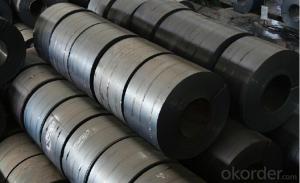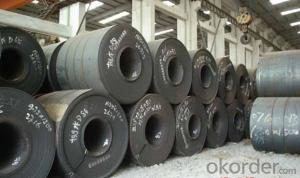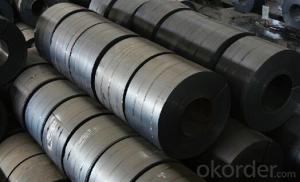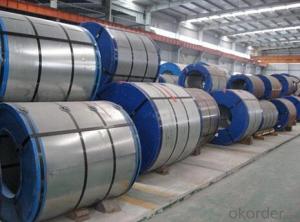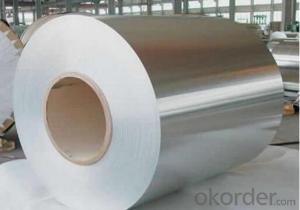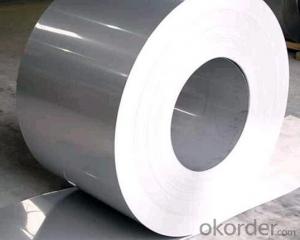Hot Rolled Steel Strips in Coils_Hot Rolled Coil
- Loading Port:
- Tianjin
- Payment Terms:
- TT OR LC
- Min Order Qty:
- 25 m.t.
- Supply Capability:
- 10000 m.t./month
OKorder Service Pledge
OKorder Financial Service
You Might Also Like
Item specifice
Hot Rolled Steel Strips in Coils_Hot Rolled Coil
Quick Details
Name | Hot Rolled Steel Coil |
Standard | GB/ASTM/SAE/AISI/DIN/JIS/EN/BS |
Surface Treatment: | Black/Peeling/Polished/Machined |
Delivery Condition: | Hot Rolled or Forged/Peeled or Black Surface |
Test | SGS/UT 100% Elements Testing |
Certificate: | ISO/Mill Certificate |
Service: | 24 hours online service / |
more than 20 years trading and manufacture | |
Quality Assurance: | the third party inspection, such as SGS, BV, TUV…etc. is acceptable |
Packaging Details: | Seaworthy Packaging or as per customer's packing instruction |
Specification
Product Name | Steel Grade | Thickness | Width | Application |
|
| |||
mm | m | |||
General structural steel | Q195,Q215A-Q235A/B/C/D | 1.9~25.4 | 0.7~2 | normal construction |
Q275A/B/C/D; SS330,SS400,SPHT1/2/3 | ||||
Low Carbon steel | SPCC,SPHC,St12,SAE1008; SPHD,SPCDK,St12,St13; SPHE,SPCE,St14 IF3 BH340 | 1.9~25.4 | 0.7~2 | Applied for cold rolling |
Carbon constructional quality steel | 08-45#,08Al15Al,S 20C S 35C | 1.9~25.4 | 0.7~2 | After being machined |
S 45C, K08AlZ06-10AlP | and hot treated to used as mechanical component | |||
Low-alloy constructional steel | SM490ASM490YA15Mn, Q345A Q345B Q345C Q345D | 1.9~25.4 | 0.7~2 | normal construction |
Hot Rolled Steel Chequered Coil | Q235 and custom | 2.0~ 8.0 | 0.9 |
|
Company Information
CNBM International Corporation is the most import and export platform of CNBM group(China National Building Material Group Corporation) ,which is a state-owned enterprise, ranked in 270th of Fortune Global 500 in 2015.
With its advantages, CNBM International are mainly concentrate on Cement, Glass, Iron and Steel, Ceramics industries and devotes herself for supplying high quality series of refractories as well as technical consultancies and logistics solution.
After-sale service | l CNBM provides the services and support you need for every step of our cooperation. We’re the business partners you can trust; you can relax and get on with doing business. |
l For any problem, please kindly contact us at any your convenient time, we’ll reply you in our first priority within 24 hours | |
Advantages | Industry experience over 20 years. |
Shipment of goods -More than 70 countries worldwide. | |
The most convenient transport and prompt delivery. | |
Competitive price with best service. | |
High technical production line with top quality products. | |
High reputation based on best quality products. |
Product Show
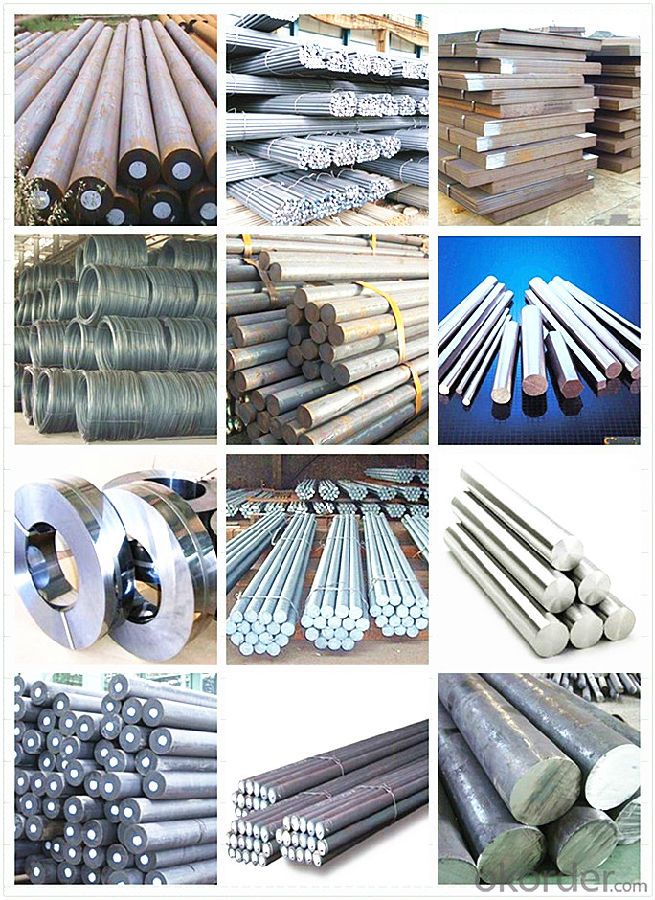
FAQ
Are you a trading company or manufacturer? | Manufacturer |
What’s the MOQ? | 3 metric ton |
What’s your delivery time? | 15-35 days after downpayment received |
Do you Accept OEM service? | Yes |
what’s your delivery terms? | FOB/CFR/CIF |
What's the Payment Terms? | 30% as deposit,70% before shipment by T/T |
Western Union acceptable for small amount. | |
L/C acceptable for large amount. | |
Scrow ,Paybal,Alipay are also ok | |
Why choose us? | Chose happens because of quality, then price, We can give you both. |
Additionally, we can also offer professional products inquiry, products knowledge train (for agents), smooth goods delivery, excellent customer solution proposals. | |
What's your available port of Shipment? | Main Port, China |
What’s your featured services? | Our service formula: good quality+ good price+ good service=customer's trust |
Where are your Market? | Covering more than 160 countries in the world |
- Q:How does stainless steel contribute to the production of medical implants?
- Stainless steel contributes to the production of medical implants by providing a highly durable and corrosion-resistant material that is compatible with the human body. It is used in various implants such as joint replacements, dental implants, and surgical instruments due to its strength, biocompatibility, and ability to withstand sterilization processes.
- Q:How does special steel contribute to the aerospace structural industry?
- Special steel plays a crucial role in the aerospace structural industry by providing a range of important attributes that are necessary for the construction of aircraft components. Firstly, special steel offers exceptional strength and durability, allowing it to withstand the extreme conditions and stresses experienced during flight. This is particularly important for critical components such as landing gear, engine parts, and wing structures which are subjected to high temperatures, pressure, and vibrations. Furthermore, special steel possesses excellent corrosion resistance, which is vital for ensuring the longevity and reliability of aerospace structures. Aircraft are constantly exposed to harsh environments, including high humidity, saltwater, and chemicals, which can lead to corrosion and degradation if not properly protected. The use of special steel helps to prevent these issues, ensuring the structural integrity of the aircraft throughout its lifespan. In addition to its strength and corrosion resistance, special steel also offers other desirable properties such as heat resistance, fatigue resistance, and weldability. These characteristics make it suitable for a wide range of aerospace applications, including the construction of fuselage frames, engine mounts, fasteners, and hydraulic systems. By utilizing special steel in these components, aerospace manufacturers can achieve lightweight designs without compromising on strength and safety. Moreover, special steel enables engineers to push the boundaries of aircraft performance by facilitating the development of advanced technologies. For instance, the use of special steel alloys in turbine blades allows for higher operating temperatures, which in turn improves engine efficiency and reduces fuel consumption. This contributes to the overall sustainability and environmental friendliness of the aerospace industry. In summary, special steel is a vital material in the aerospace structural industry as it provides the necessary strength, durability, corrosion resistance, and other essential properties required for the construction of aircraft components. Its contribution allows for the development of safer, more efficient, and technologically advanced aircraft, ultimately benefiting the aerospace industry as a whole.
- Q:What are the different testing methods for special steel?
- To ensure the quality and performance of special steel, there are various testing methods commonly used. These methods encompass: 1. Chemical Analysis: Determining the steel's chemical composition, including elements and impurities, is crucial. It confirms adherence to specific chemical composition requirements. 2. Mechanical Testing: Evaluating mechanical properties like strength, ductility, hardness, and toughness is achieved through tests such as tensile, impact, hardness, and fatigue testing. 3. Microstructure Analysis: Assessing the steel's internal structure, grain size, and shape requires microscopic examination. Techniques like optical and electron microscopy, as well as X-ray diffraction, help identify any defects or abnormalities. 4. Non-Destructive Testing (NDT): Inspecting the steel without causing damage is possible through NDT methods. These include ultrasonic, magnetic particle, liquid penetrant, and radiographic testing to detect surface and subsurface defects. 5. Corrosion Testing: In applications where corrosion resistance is vital, various methods like salt spray, electrochemical, and immersion testing are employed. They evaluate the steel's resistance and corrosion rate. 6. Metallography: Preparing a cross-section of the steel sample, polishing it, and etching it reveals its microstructure. This aids in assessing quality, heat treatment effects, and grain size distribution. 7. Dimensional and Surface Inspection: Ensuring the steel meets required dimensional tolerances and surface quality is crucial. Techniques like dimensional measurement, surface roughness measurement, and visual inspection verify conformity. By implementing these testing methods, manufacturers and quality control personnel ensure that special steel meets the necessary standards, specifications, and customer requirements.
- Q:Can special steel be used in the defense industry?
- Yes, special steel can be used in the defense industry. Special steel alloys, such as armor-grade steel or stainless steel, possess unique properties that make them suitable for various defense applications. These steels offer enhanced strength, durability, and resistance to corrosion and high temperatures, making them ideal for manufacturing military vehicles, aircraft, naval vessels, and ballistic protection systems. Additionally, special steel can also be used in the production of weaponry, including firearms, missiles, and armored vehicles, due to its ability to withstand extreme conditions and provide superior performance in combat situations.
- Q:How does special steel contribute to the chemical industry?
- Special steel contributes to the chemical industry by providing key materials for various applications. It is used in the construction of chemical processing equipment, such as reactors, heat exchangers, and storage tanks, due to its corrosion resistance and high strength. Special steel alloys can withstand harsh chemical environments, ensuring safety and durability in chemical operations. Additionally, special steel is utilized for manufacturing catalysts, which play a crucial role in catalytic reactions and chemical synthesis processes. Overall, special steel enhances the efficiency, reliability, and performance of equipment and catalysts in the chemical industry.
- Q:How does copper influence the characteristics of special steel?
- Copper has a significant influence on the characteristics of special steel due to its unique properties and its role as an alloying element. When added to steel in small amounts, copper can enhance its strength, hardness, and resistance to corrosion. One of the key benefits of copper in special steel is its ability to improve the steel's mechanical properties. Copper increases the strength and hardness of steel, making it more suitable for applications that require high tensile strength and durability. This is particularly important in industries such as construction, automotive, and aerospace, where strong and durable steel is essential. Furthermore, copper also enhances the steel's resistance to corrosion. It forms a protective oxide layer on the surface of the steel, preventing the formation of rust and other forms of corrosion. This makes copper-infused steel ideal for use in harsh environments or applications where exposure to moisture or corrosive substances is common. Additionally, copper can improve the machinability of special steel. It acts as a lubricant during the machining process, reducing friction and heat generation. This results in improved tool life, reduced energy consumption, and enhanced productivity. In summary, the addition of copper to special steel can significantly influence its characteristics. It enhances the steel's strength, hardness, and corrosion resistance, making it more suitable for demanding applications. Moreover, copper also improves the machinability of steel, leading to increased productivity and cost-effectiveness.
- Q:How does special steel contribute to the power generation aftermarket industry?
- The power generation aftermarket industry relies heavily on special steel, which is essential for constructing and maintaining power generation equipment. Special steels, such as stainless steel and alloy steel, possess unique characteristics that make them perfectly suited for the demanding conditions of the power generation sector. One of the key advantages of special steel in the power generation aftermarket industry is its exceptional resistance to corrosion and oxidation. Power generation equipment, such as gas turbines and steam generators, operate in harsh environments with extreme temperatures, pressure, and exposure to various chemical elements. Special steel's corrosion resistance ensures that the equipment can withstand these challenging conditions, minimizing the risk of failure and extending the lifespan of the equipment. Furthermore, special steel provides excellent strength and toughness, enabling power generation equipment to withstand high mechanical stress and fatigue. Turbines, boilers, and other heavy machinery in the power generation industry undergo continuous operation and significant loads. Special steel's high strength and durability allow these components to endure these demanding conditions, ensuring safe and reliable operation. Special steel also maintains dimensional stability under extreme temperatures, which is crucial for power generation equipment. As power generation equipment often operates at high temperatures, special steel's thermal stability prevents distortion and deformation, ensuring that the equipment retains its shape and functionality over time. Additionally, special steel's versatility enables the production of customized components and parts that meet the specific requirements of power generation equipment. Whether it is turbine blades, boiler tubes, or heat exchangers, special steel can be tailored to provide the desired mechanical properties, corrosion resistance, and thermal stability required for each application. Overall, special steel is an indispensable material in the power generation aftermarket industry. Its corrosion resistance, strength, toughness, thermal stability, and versatility make it an ideal choice for constructing and maintaining power generation equipment. By providing reliable and durable materials, special steel contributes to the efficiency, safety, and longevity of power generation systems, ensuring the continuous supply of electricity to meet the growing demands of our modern world.
- Q:How does special steel contribute to improving product resistance to environmental factors?
- Special steel contributes to improving product resistance to environmental factors in several ways. Firstly, special steel alloys often have enhanced corrosion resistance, protecting the product from damage caused by exposure to moisture, chemicals, and other corrosive substances present in the environment. Additionally, special steel can offer improved strength and durability, enabling the product to withstand harsh conditions such as extreme temperatures, high pressure, or mechanical stress. Furthermore, special steel can exhibit excellent fatigue resistance, ensuring that the product maintains its structural integrity even after prolonged exposure to cyclic loading or repetitive stress. Overall, the unique characteristics of special steel make it a valuable material for enhancing the resistance of products to various environmental factors, ultimately prolonging their lifespan and reducing maintenance costs.
- Q:What are the characteristics of special stainless steel?
- Special stainless steel is known for its unique properties that set it apart from regular stainless steel. Some of the key characteristics of special stainless steel include: 1. High Corrosion Resistance: Special stainless steel has a higher level of corrosion resistance compared to regular stainless steel. It can withstand exposure to harsh environments, such as saltwater or acidic substances, without corroding or deteriorating. 2. High Temperature Resistance: Special stainless steel is designed to withstand high temperatures without losing its structural integrity. It can endure extreme heat, making it suitable for applications in industries like aerospace, automotive, and power generation. 3. Enhanced Strength and Durability: Special stainless steel is often alloyed with other elements to enhance its strength and durability. This makes it highly resistant to deformation, cracking, and wear, ensuring its longevity and reliability in demanding conditions. 4. Excellent Mechanical Properties: Special stainless steel exhibits exceptional mechanical properties, including high tensile strength, toughness, and ductility. These properties make it ideal for applications that require high load-bearing capacity, such as structural components and machinery. 5. Unique Magnetic Properties: Depending on its composition, special stainless steel can exhibit various magnetic properties, ranging from non-magnetic to highly magnetic. This versatility allows it to be used in applications where magnetic properties are required, such as magnetic resonance imaging (MRI) machines or electrical transformers. 6. Hygienic and Easy to Clean: Special stainless steel is known for its hygienic properties, which make it suitable for applications in the food and healthcare industries. It is non-porous, resistant to bacteria growth, and easy to clean, making it an ideal choice for equipment and surfaces that require strict sanitary standards. 7. Aesthetic Appeal: Special stainless steel is often used in architectural and design applications due to its aesthetic appeal. It can be polished to a mirror-like finish, giving it a sleek and modern look. Additionally, it can be easily shaped and welded, allowing for creative design possibilities. In summary, special stainless steel possesses a combination of high corrosion resistance, temperature resistance, strength, durability, excellent mechanical properties, unique magnetic properties, hygienic features, and aesthetic appeal. These characteristics make it a preferred choice for a wide range of industrial, commercial, and domestic applications.
- Q:What are the properties of case-hardening steel?
- Case-hardening steel is a type of steel that possesses surface hardness and wear resistance while maintaining a relatively soft and tough interior. It is achieved by introducing carbon into the outer layer of the steel through a process called carburization, which forms a hardened case. The core of the steel remains relatively softer, providing toughness and resistance to impact. This combination of properties makes case-hardening steel ideal for applications requiring a hard and durable outer surface, such as gears, bearings, and tools.
1. Manufacturer Overview |
|
|---|---|
| Location | |
| Year Established | |
| Annual Output Value | |
| Main Markets | |
| Company Certifications | |
2. Manufacturer Certificates |
|
|---|---|
| a) Certification Name | |
| Range | |
| Reference | |
| Validity Period | |
3. Manufacturer Capability |
|
|---|---|
| a)Trade Capacity | |
| Nearest Port | |
| Export Percentage | |
| No.of Employees in Trade Department | |
| Language Spoken: | |
| b)Factory Information | |
| Factory Size: | |
| No. of Production Lines | |
| Contract Manufacturing | |
| Product Price Range | |
Send your message to us
Hot Rolled Steel Strips in Coils_Hot Rolled Coil
- Loading Port:
- Tianjin
- Payment Terms:
- TT OR LC
- Min Order Qty:
- 25 m.t.
- Supply Capability:
- 10000 m.t./month
OKorder Service Pledge
OKorder Financial Service
Similar products
New products
Hot products
Hot Searches
Related keywords
